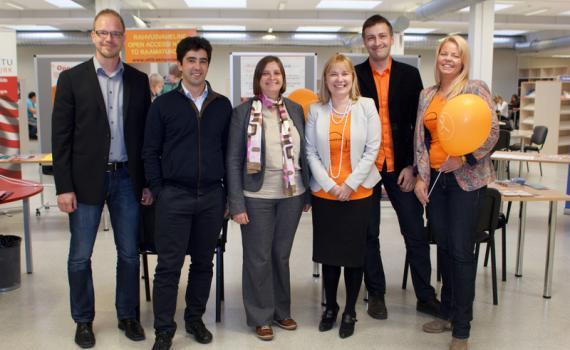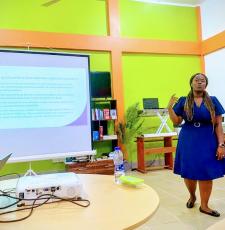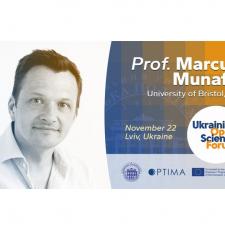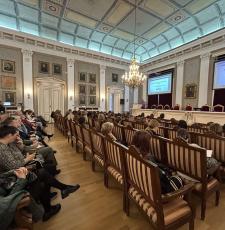
Elena Sipria-Mironov, librarian at the University of Tartu Library and EIFL Open Access Coordinator, discusses how open access and open science have changed the academic and scientific landscape in Estonia.
Estonia's journey towards open access and open science has been marked by transformative changes in its academic and scientific landscape. Through different initiatives and the establishment of supportive infrastructure, as well as an emphasis on open data, Estonia has embraced a more inclusive, transparent, and collaborative research culture. The adoption of open access and open science principles has been in many ways supported by EIFL and led to increased visibility and impact for Estonian research, while fostering greater collaboration and trust between researchers and society.
Building Momentum and Inclusivity
Open access activities in Estonia began to gain momentum when the Estonian Libraries Network Consortium (ELNET Consortium) together with academic libraries and some open access advocates from different scientific disciplines recognized the need for a more open and inclusive approach to research communication. In the mid-2000s, first initiatives were launched to promote OA, including the development of institutional repositories and a national platform to host scholarly outputs. These early efforts laid the foundation for the country's commitment to open access and open science initiatives. The process of developing, implementing, and managing change was mostly initiated by the University of Tartu Library in collaboration with various stakeholders, including government bodies, funding agencies, academic institutions and researchers. Starting in 2010, Open Access Week in Estonia has become a prominent annual event that celebrates and promotes the principles of open access and open science within the country's academic and research community.
Estonia's academic and research libraries now actively promote and support open access publishing, repository development, and research data sharing. This shift is facilitated by awareness-raising campaigns, workshops, and seminars that encourage researchers to embrace open access and open science principles as part of their scholarly practice.
Over time, open access and open science became ingrained in Estonia's research culture, leading to enhanced visibility, collaboration, and trust in the academic community.
“Through different initiatives and the establishment of supportive infrastructure, as well as an emphasis on open data, Estonia has embraced a more inclusive, transparent, and collaborative research culture.” - Elena Sipria-Mironov, University of Tartu Library and EIFL OA Coordinator in Estonia
Policy Framework and Funding 
At the same time the Estonian government, research institutions and funding agencies recognized the importance of making research outputs freely accessible to the public and other researchers worldwide. A number of important documents have been developed in Estonia, where open science is mentioned, but the national policy has not been clearly formulated so far.
The largest research funding instruments in Estonia are the core financing and grants, allocated through the budget of the Ministry of Education and Research, under the administration and responsibility of the Estonian Research Council (ETAg). By allocating resources and grants to support open access initiatives, ETAg has incentivized researchers to share their work openly. Through policy development, capacity building, and advocacy efforts, ETAg has contributed to fostering an open science culture in Estonia.
The development of institutional repositories and Estonian Research Information System (ETIS) provide a centralized platform for researchers to share and access research outputs. Self-archiving in ETIS has been mandatory for almost 10 years and Article Processing Charges (APC) are also eligible project costs. The vast majority of research journals published in Estonia with public funding now follow open access principles and apply the conditions of open content licensing (35 journals in DOAJ).
In 2015, the Estonian Research Council established the Open Science Expert Group which has compiled a general principles and policy recommendations document for open science in Estonia. The purpose of the document was to create a common framework and understanding of how to handle open science issues and to encourage the development of national strategy and institutional policies for open science.
At the end of 2019, the Ministry of Education and Research in Estonia began to develop a Roadmap for an Open Science Policy Framework that will be an annex to the Estonian Research and Development, Innovation and Entrepreneurship Strategy 2021—2035. It is expected that in the next few years, the official policy will be launched and an Estonian Open Science Competence Center will be established to provide a central support system for open science implementation in Estonia.
Support for Open Data
In recent years, open data has been a cornerstone of Estonia's open science movement. Researchers are now encouraged to make their research data openly available, enabling reproducibility and facilitating collaboration between scientific communities. This commitment to open data has resulted in improved data management practices and greater trust in research findings.
Estonia has made remarkable progress in establishing data repositories to bolster open science and research data management. These repositories play a vital role in promoting transparency, collaboration and the adoption of FAIR (Findable, Accessible, Interoperable, Reusable) principles.
In 2015, the University of Tartu, Tallinn University of Technology, the Estonian University of Life Sciences and Tallinn University founded the DataCite Estonian Consortium, which aims to improve the availability of Estonian scientific data and facilitate the international use of scientific data. The consortium ensures spreading and availability of high-quality research resources created by members of the affiliated research institutions.
From 2017, there has been a requirement that grant applications indicate how the applicant will manage the data obtained during the project. The Estonian Research Council has started to require research data management plans from all personal grant applications and has officially started to evaluate these plans.
The University of Tartu, being one of the leading research institutions in Estonia, offers various courses related to open data and open science practices. Other universities, academic libraries, and research organizations also offer open data courses and workshops to support researchers in adopting open science practices.These courses demonstrate the institution's commitment to fostering open science and research data management skills among PhD students. Based on feedback, it can be emphasized that early career researchers are very willing to practice open science. They bring their knowledge and skills to research groups, ensuring proper data management and publication to get credit for all research-associated activities.
Future Plans and Highlights (2023-2024)
Estonia continues to be at the forefront of the open science movement, with ambitious plans and highlights for further promoting transparency, collaboration, and data sharing in research. Some highlights during next period include:
- Strengthening Open Science Policies: One of the problems facing Estonia today is the lack of a clear policy regarding open science and open data. Therefore, there is also the lack of institutional requirements. The government and funding agencies are working to implement a new strategy for R&D, innovation and entrepreneurship 2021-2035. To elaborate on the more specific subtopics of Open Science, a supporting document for the strategy is needed.
- Open Science Training and Capacity Building: Educational institutions and research organizations are collaborating to offer comprehensive training and capacity-building programmes for researchers. These initiatives aim to equip researchers with the necessary skills and knowledge to effectively manage, share, and publish open research data.
- FAIR Data Implementation: Estonia is emphasizing the importance of FAIR data principles. Researchers are encouraged to make their data machine-readable and adherent to FAIR principles to enhance data discoverability and reuse.
- Collaborative Projects and Funding: The country is actively engaging in collaborative open science projects at both the national and international levels. Researchers are encouraged to participate in interdisciplinary initiatives and apply for funding that supports open science practices and innovative research projects.
- Public Engagement and Open Science Advocacy: Estonia is focusing on increasing public engagement in research through open science. Efforts are being made to raise awareness about the value of open access research and involve the public in citizen science projects.
- International Partnerships: By actively participating in global discussions and sharing best practices, Estonia aims to contribute to the advancement of open science principles on the international stage. One prominent international partnership for Open Science in Estonia is the collaboration with the European Open Science Cloud (EOSC). Through this partnership, Estonia contributes to the development and implementation of EOSC services, infrastructure, and policies, aligning with the European Union's vision for open and collaborative research.
- Monitoring and Evaluation: Continuous monitoring and evaluation of open science initiatives are key priorities. The country is committed to assessing the impact of policies and projects to identify areas for improvement and ensure effective implementation of open science practices.
By pursuing these plans and highlights, Estonia envisions a future where open science becomes even more deeply ingrained in the research culture, leading to increased research visibility, collaboration, and societal impact.
EIFL’s role in driving change
EIFL has played an important role in driving the change towards open access and open science in Estonia. As an international organization that works to enable access to knowledge, EIFL actively engaged with Estonian libraries and research institutions to promote the adoption of open access practices. Through capacity-building programs, workshops, and training sessions, EIFL helped raise awareness about the benefits of open access and open science among librarians, researchers, and policymakers in Estonia. Moreover, EIFL provided valuable support in developing and implementing institutional repositories, facilitating the dissemination of scholarly works and research data.
By advocating for open access policies and fostering partnerships with national stakeholders, EIFL has been instrumental in strengthening Estonia's commitment to open access and open science, transforming the country into a regional leader in the global open research movement.
SHARE / PRINT









